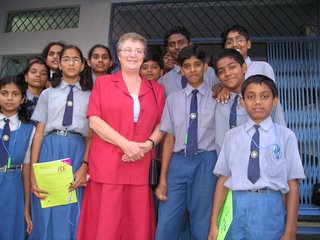SEW IV: CEFR C1
The FACTS first
Tasks: telephone task, interactive task, formal presentation, candidate-led discussion, general discussion on one of the given topic area
Time: 27 minutes
Profile: Among other things, a SEW 4 candidate has to prove proficiency in speaking [oops! pardon such a general term; read ‘justifying’, ‘defending’, ‘countering’, ‘persuading’, ‘dissuading’, ‘convincing’ etc] spontaneously and effortlessly in a work context and in using language flexibly and effectively for social, academic and professional purposes.
Now the EXPERIENCE
By taking my SEW [Spoken English for Work] exam last week, I realized two things. Firstly, even after all these years, I am still quite a victim to typical exam-panic syndrome that most of us have experienced as adolescents, i.e sweaty palms, racing heart, blank mind, frantic last minute rehearsals et al. Annoyed as I was at myself for these juvenile demonstrations of panic, nevertheless I justified that these were all part of the game! I just had to ‘play it cool,’ a reassuring colleague advised.
Secondly, strangely enough, unlike other exams that I have taken in the past, this feeling of panic DID NOT trickle into the actual test taking experience this time. On hindsight, I realize that it was a simple equation that worked amazingly well for me. The tasks were so real and demanded such spontaneous response that I did not have the chance to remain preoccupied or apprehensive, which in turn steadily reinstated my ebbing confidence. It DID turn out to be ‘cool’ after all!!!
I can’t help but borrow the tag line of the advertisement of a popular product in India to describe my experience of taking the Trinity SEW Exams: IT’S DIFFERENT!
And here’s why
The nature and scope of the tasks, the examiner’s participation…all worked as a support system to provide me an optimum condition to do my best. Not many exams can claim to do that!
The SEW tasks tested my capability of handling a real impromptu exchange, something essentially different from the prepared or rehearsed production of language. From the moment that I was given the prompt for the telephone task, I had completely forgotten that I was being tested. I had immediately turned into the HR Manager of a company that has laid off employees and who now had to defend the company’s action to a disapproving editor of a national daily. And defend I did! Exactly as I would have done if my current employer would have been in a similar soup [god forbid!].
The formal presentation, I admit, did not have the thrill of the impromptu tasks, since it was a planned, prepared and rehearsed presentation. Yet, it was challenging in its own way, since it had its own special parameters that were assessed. Preparing for it has been quite a learning process.
Aren’t most exams typically a one-way process in which the entire onus of performance is on the examinee [while the examiner waits with a sardonic smile to pounce on your mistakes]? Apparently not! Things are refreshingly different in these exams. I was definitely not a solo performer demonstrating required functions through monologues and soliloquies. Throughout the role plays, discussions and conversation the examiner’s responses not only complemented mine but served as tools in eliciting the required language/function out of me.
Overall, it was a very compact, real, relevant experience.
Till now I had heard about the ‘can do’ philosophy that Trinity exams promote and endorse; now I know how they make it work.
Cheers!! to being ‘different.’
-- Sreyoshi Bose
 We believe we have picked up several important clues to aid our language teaching. We have become better professionals and we look forward to doing the next level.
We believe we have picked up several important clues to aid our language teaching. We have become better professionals and we look forward to doing the next level. 